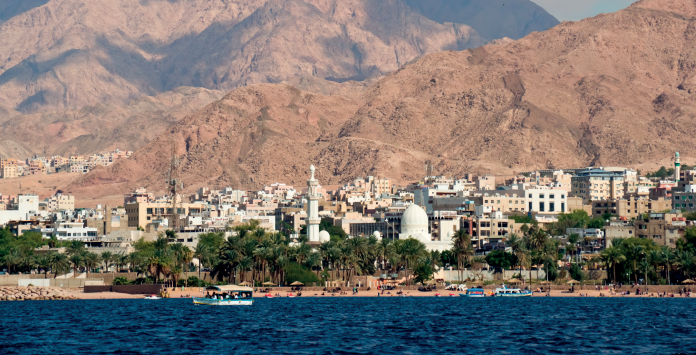The only coastal city of what may be the world’s most water scarce country has prioritised “Zero Discharge”, cleaning up the air by cleaning up its water and wastewater system.
Inhabited for 6,000 years, Aqaba sits at the point where Jordan reaches the Red Sea. Its beach resorts are popular for sunbathing and windsurfing, while the Yamanieh coral reef attracts scuba divers from around the world. Booming growth put these magnets at risk.
So to protect the quality of its marine environment and preserve the region’s attractiveness for tourism, the port city has committed to making huge investments into collection and treatment of 61,000 cubic metres per day from sewer and wastewater by 2030.
Aqaba’s resource recovery strategy generates US$4 million in income for the city, maintaining green areas and urban landscapes. Above all, it reduces carbon emission through enhanced operation and energy efficiency, as well as through production of carbon neutral power from solar farms and biogas. Ultimately, the city will recover 100 percent of its energy.
Aqaba was profiled at IWA’s Development Congress in Buenos Aires, among eight cities to illustrate the wastewater challenge and reuse opportunity. It demonstrated how transition to a circular economy is not limited to the “usual suspects” of pioneering cities such as Singapore or Stockholm.
Other cities that recover a significant portion of energy from wastewater include Bangkok (62 percent), Beijing (45 percent), Chennai (77 percent), and Kampala (227,000 Kwh/y).
The ‘zero discharge’ targets are ambitious, and policies must be targeted toward industry and backed by meaningful incentives. The global market for wastewater recycling and reuse should reach US$22.3 billion by 2021. New innovations in technology help open opportunities and make the transition affordable.
“Whilst the necessity of wastewater reuse in water scarce places like Aqaba is apparent,” observes the IWA’s soon to be released The Reuse Opportunity report, “cities everywhere are increasingly taking proactive actions to improve their water security. They are given greater autonomy; decision making is decentralised, and systems are being adapted to local drivers and demands.”








